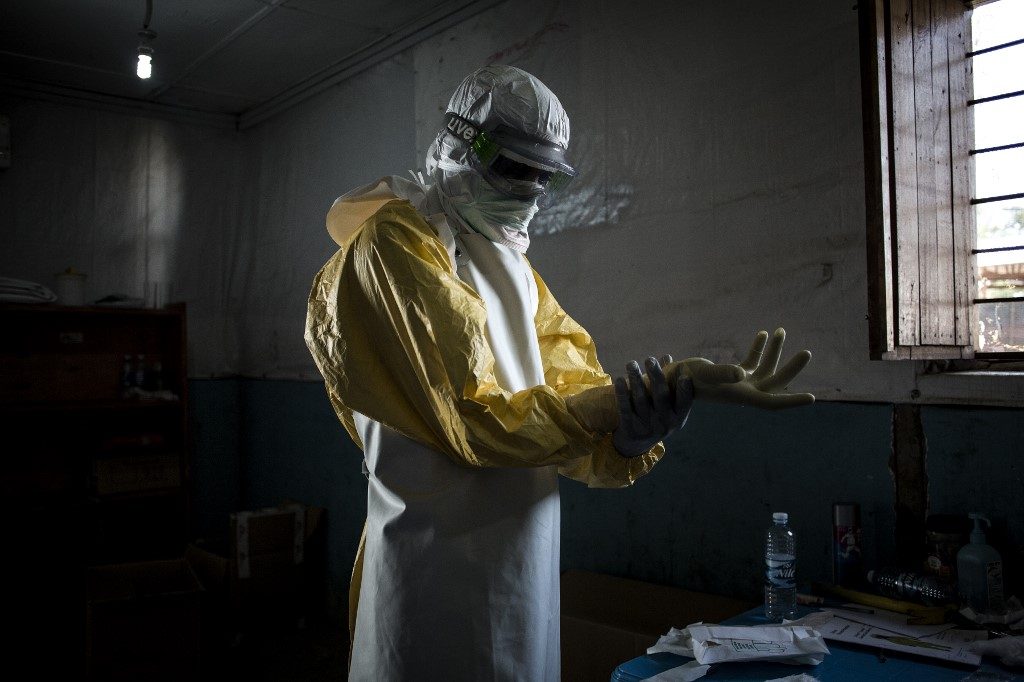SUMMARY
This is AI generated summarization, which may have errors. For context, always refer to the full article.

BUKAVU, DR Congo – A woman has died of Ebola and her infant son was diagnosed with the virus in the first confirmed cases in DR Congo’s South Kivu province, reviving fears Friday, August 16, the highly contagious disease could spread through the region. (READ: Fast Facts: Ebola)
The Democratic Republic of Congo’s Ebola epidemic has claimed more than 1,900 lives since erupting last August 2018.
“Two cases which tested positive for Ebola were confirmed overnight in South Kivu, in Lwindi district in the Mwenga region,” the provincial government said in a statement.
A woman in her twenties died while her 7-month-old child tested positive for the virus and is receiving treatment, the vast central African nation’s pointman on Ebola, Jean-Jacques Muyembe, said in a statement.
The woman had been staying with a family in the North Kivu town of Beni, the epicenter of the outbreak, and was identified as a “high-risk contact” of one of the family members infected with Ebola, the statement said.
She then “escaped” movement controls in the area, changing identities four times and travelling from Beni through the North Kivu cities of Butembo and Goma to South Kivu’s Bukavu and Mwenga, the statement added.
She died on Wednesday, August 14.
“We reassure neighboring countries that all steps are being taken to strengthen surveillance at points of entry as well as sanitary control,” the statement said.
South Kivu shares borders with Rwanda, Burundi, and Tanzania.
World Health Organization (WHO) chief Tedros Adhanom Ghebreyesus tweeted that the outbreak in South Kivu “has sparked a rapid response…to provide treatment, identify all contacts, raise community awareness & begin vaccinating.”
The International Federation of Red Cross and Red Crescent Societies (IFRC) said it was “rapidly deploying an expert team” to the area.
And South Kivu Governor Theo Ngwabidje told reporters: “Teams from the national anti-Ebola coordination campaign arrived yesterday to provide support.” (READ: 5 misconceptions about Ebola)
Risk of crossing border ‘enormous’
The outbreak of the haemorrhagic virus began in neighbouring North Kivu province on August 1, 2018 and spread to Ituri province.
The WHO declared the epidemic a “public health emergency of international concern” last month after cases were confirmed in the densely-populated North Kivu capital Goma. (READ: Ebola cases in DR Congo break 2,000 mark)
The city’s proximity to Rwanda and many transport links sparked fears of cross-border spread.
“Beni, Butembo and Goma are still containable,” a Congolese professor and epidemiologist said of the 3 North Kivu cities.
“But with the disease in South Kivu, the risks of it spreading to (the eastern DR Congo town) of Kalemie, Tanzania and Burundi are enormous.”
Residents in South Kivu’s capital Bukavu said they were worried.
“At this time of year, we rarely have running water – how are we going to avoid this disease if we have to frequently wash our hands?” asked mother-of-five Martine Mushagalusa.
Anselme Kangeta, 35, said: “Given the crowded way we live, movement is uncontrolled, people go from one place to another without taking precautions. The authorities must get involved otherwise we will all die.”
South Kivu experienced an Ebola scare on July 31 when doctors briefly quarantined 15 people in the town of Birava over fears they were infected, but tests came back negative.
Drug breakthrough
Ebola is named after a river in northern DR Congo, formerly named Zaire, where the virus was first identified in 1976.
The latest outbreak is the second-deadliest on record after more than 11,000 people were killed in Guinea, Sierra Leone and Liberia between 2014-2016.
The pathogen causes fever, vomiting and severe diarrhea, often followed by kidney and liver failure, and internal and external bleeding.
The disease is spread by contact with infected bodily fluids and is fought with the time-honored but laborious techniques of tracing contacts and quarantining them.
The cases in South Kivu come on the heels of researchers announcing a possible breakthrough in the quest for a drug to treat Ebola. Two prototype drugs, REGN-EB3 and mAb114, slashed mortality rates among Ebola patients in a trial in eastern DR Congo.
The authorities have also deployed a US-made vaccine called rVSV-ZEBOV, which is unlicensed but has been widely tested for safety.
Muyembe, appointed by President Felix Tshisekedi to coordinate the campaign against Ebola, predicted Thursday, August 15, that with the new drugs and vaccine “we can manage to completely control the epidemic in three to four months”.
Nearly 200,000 people have been vaccinated to date.
Burundi said Wednesday, August 14, it had begun vaccinating frontline workers at its border with DR Congo. – Rappler.com
Add a comment
How does this make you feel?
There are no comments yet. Add your comment to start the conversation.